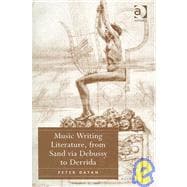
Note: Supplemental materials are not guaranteed with Rental or Used book purchases.
Purchase Benefits
What is included with this book?
| Foreword, with Apologies | vii | ||
| 1 Translating the Raindrop | 1 | (10) | |
| 2 A Sermon on the Violin | 11 | (14) | |
| 3 Baudelaire's Wagner: The Indescribable, the Untranslatable, the Inaudible | 25 | (14) | |
| 4 Keeping the Voice of the Nightingale Alive in the Age of Mechanical Reproduction | 39 | (24) | |
| 5 On the Evidence of Mallarmé's Music | 63 | (16) | |
| 6 How Music Enables Proust to Write Paradise Lost | 79 | (18) | |
| 7 'Song Must Write': Roland Barthes's Hallucinations | 97 | (16) | |
| 8 'Sing Me a Song to Make Death Tolerable': Music in Mourning for Derrida | 113 | (18) | |
| Conclusion | 131 | (4) | |
| Bibliography | 135 | (4) | |
| Index | 139 |
The New copy of this book will include any supplemental materials advertised. Please check the title of the book to determine if it should include any access cards, study guides, lab manuals, CDs, etc.
The Used, Rental and eBook copies of this book are not guaranteed to include any supplemental materials. Typically, only the book itself is included. This is true even if the title states it includes any access cards, study guides, lab manuals, CDs, etc.